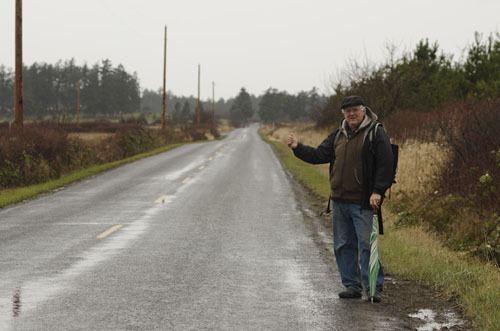By Scott Finley
Special to the Islands’ Weekly
Transportation makes up more than one-quarter of U.S. greenhouse gas (GHG) emissions. The average American household burns over 1,000 gallons of gasoline and emits 21,000 pounds of CO2 annually from its 1.85 vehicles, and spends nearly a fifth of its income doing so.
These startling numbers were brought up in a lively discussion after the first showing of the Locavore’s film series, presented in November. The featured documentary “The Power of Community: How Cuba Survived Peak Oil,” is an invaluable look at the creative resilience of Cuba after the U.S. oil embargo forced it to make radical changes in every aspect of lifestyle and economy. The film inspired Lopezians to start talking and then brainstorming about a more sustainable and energy efficient island.
“It was an inspiring film and discussion,” said Chom Greacon. “And we actually came away with concrete steps we could take to strengthen the community, conserve energy and reduce our carbon footprint.”
Personal carbon footprint is the total amount of greenhouse gas emissions you contribute to the environment. Your carbon footprint may be a size EEE Sasquatch, or if you have taken steps to reduce your energy use, and consequently your carbon emissions, your footprint may be closer to a size 3 ballet slipper. You can reduce your footprint by insulating your house, growing and eating local, organic food as well as changing your transportation habits.
“Living Well, Living Green,” the useful booklet produced by Transition Fidalgo and Friends, lists several ways to reduce the amount of energy we use transporting ourselves: combine errands in one trip, keep your car tuned and tires inflated, or leave the car at home – hop on a bike, walk or share rides with others. Lopez Rocks, www.LopezRocks.org, has a link called “Off-Island Ride Share” which makes it very easy to pre-arrange a ride with others when leaving the Island or returning.
A culture of ride sharing or hitchhiking has been in place on the islands for years.
“We used to hitch rides home from Lopez Elementary School all the time back in the 70’s,” Faith Van De Putte said. “We’d hope for a pickup truck so we could all ride together.”
Ron Metcalf has recently started hitching rides, following up on a New Year’s resolution to do more walking and less driving, and has found it efficient and convenient.
But Metcalf hasn’t been doing much walking because he usually gets picked up by the first or second car passing by.
And he has discovered an additional benefit to hitchhiking.
“The best part of doing this is that I get to spend time with those I already know and meet those I don’t,” said Metcalf.
The after-film discussion group pounced on the idea of reducing GHG emissions by ride sharing, and came up with a plan. They formed an impromptu committee calling itself Lopez Island Free Transit, or LIFT, committed to expanding island transportation options by facilitating our existing ride share system.
San Juan Ride Share is a county-wide program has established a series of stop sites — signs at locations similar to bus stops where people who need a ride can safely wait, and drivers can safely pull over to offer rides.
The program currently has four such sites in Friday Harbor and one on Lopez Island, in front of Grace Church. LIFT is exploring an expansion of stop sites, which they are calling “thumb stops,” to include additional strategic locations, such as the Village, Hummel Lake, school, ferry terminal and Islandale store.
Additional ideas from LIFT include making available static windshield stickers to indicate a driver’s participation in the program. Another proposal is to sponsor a kickoff event in the Village, which islanders would be encouraged to hitchhike to and from.
LIFT encourages people to save fuel and reduce emissions – if you are on the road, look for fellow travelers and be ready to pick them up. Or next time you have an errand to run, stick out your thumb and catch a LIFT.





